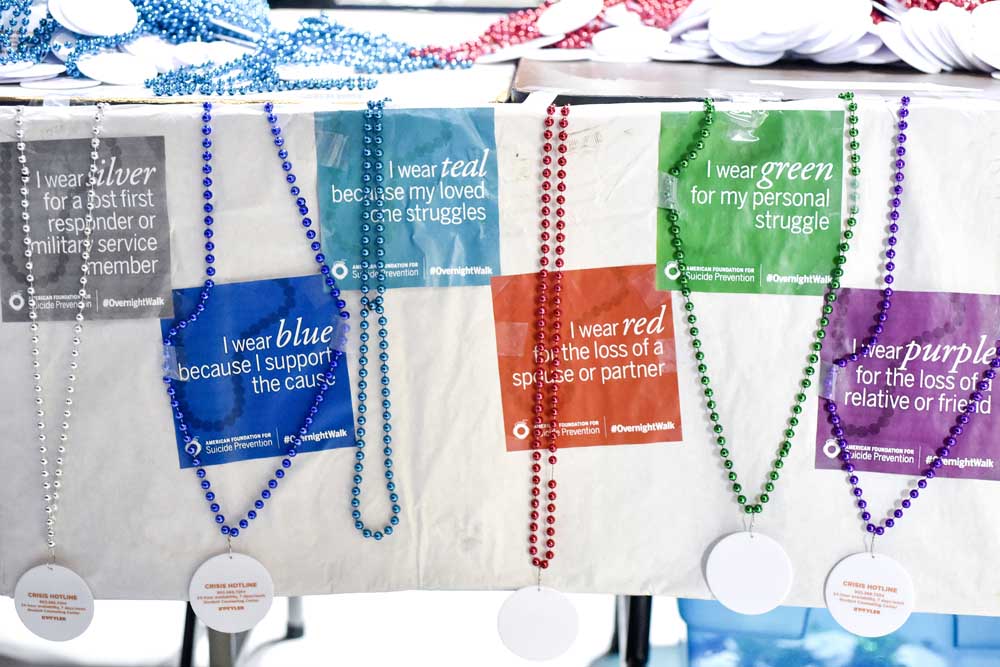UT Tyler students challenge community to have honest discussion about suicide, mental health
Published 4:15 pm Wednesday, March 28, 2018

- Different colored necklaces at the Suicide Awareness Walk at the University of Texas at Tyler in Tyler, Texas, on Wednesday, March 28, 2018. The event included booths set up with information about mental health and other resources, speakers, yoga and more. (Chelsea Purgahn/Tyler Morning Telegraph)
Students at the University of Texas at Tyler are being the change they want to see in East Texas and the world.
As the college observed its third annual Suicide Awareness Walk, students took matters into their own hands to push for better mental health advocacy in the region.
More than 75 students volunteered for this year’s event, bringing in over a dozen campus and community organizations to talk about mental health. Despite the rain forcing the event inside, the walk still drew students in to discuss how suicide has impacted their lives.
National Alliance on Mental Illness Chapter President Rey West said she wants students to know that help is available if they’re struggling with mental health issues or suicidal thoughts.
“Talking about (mental health and suicide) is definitely stigmatized in East Texas,” West said. “It was really important for me to get involved. No matter the person, or where they’re coming from, we all deal with the same things.”
West and fellow NAMI members Hannah Houghton and Sarah Freshour said as nursing students it is important for them to be able to fully understand what patients are going through and to help find resources in the community.
Freshour also said the open discussion in the group helps students deal with their own problems and creates an environment where they can be open with one another.
By talking about their struggles, the students are able to create a peer support group. They hope to educate other students and help them set up support systems of their own.
“When I was struggling with my own depression and anxiety, I didn’t know how to talk about it and who to talk with,” West said. “It somehow takes the burden off of going through something alone when you’re able to effectively talk about it.”
Houghton said the most important thing she has learned is just to be there for people.
“It’s so important to listen to people, truly hear what they have to say and support them on their journey,” Houghton said. “I think it’s hard to get help, but it’s also hard to want to get help and reach out. So it’s important to make mental health more talked about.”
As part of the event, several community members spoke about how suicide has impacted their lives.
Sybil Fisher, a teacher at the UT Tyler Innovation Academy, spoke about the loss of her son last year.
Fisher spoke about the struggle she has had since her son completed suicide and her own history of depression and anxiety.
“I was probably 55 before I was able to admit I needed something for depression or anxiety,” she said. “You have to fight for your mental health, each one of us, every day. (We have) to be vulnerable and open up enough to be transparent with each other.”
Smith County Crisis Intervention Team deputy David Biggs spoke with students about resources and stressed the importance of knowing not just where to get help, but the steps they will need to take to get help for friends and family in a crisis.
“The main thing is a lot of people don’t know that what’s normal to you is not normal to me,” he said. “What they’re living with is so traumatic they don’t know how to go any further or they don’t know how to get around it.”
Biggs said efforts such as the Suicide Awareness Walk and the coalition of community services of the Behavioral Health Leadership Team will help address the need for crisis intervention in the community.
“I think it’s going to make things better because it brings everybody to the table,” he said. “It makes everybody responsible.”
Twitter: @TMT_Cory






